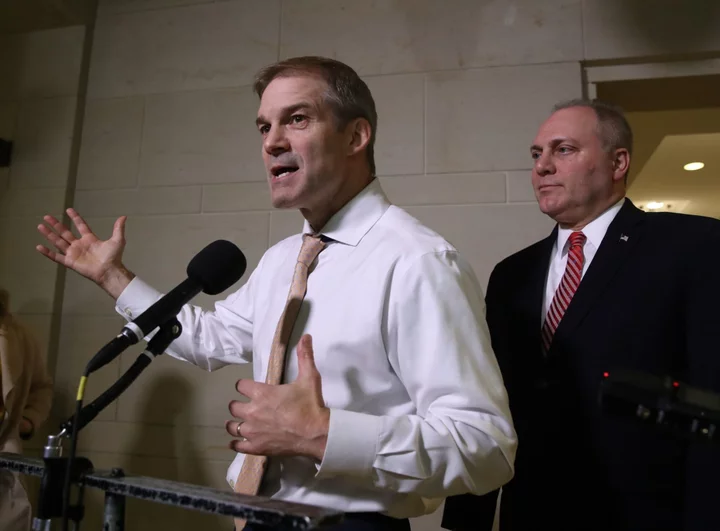The bitter battle between Representatives Steve Scalise and Jim Jordan for the US House speakership culminates a long-simmering personal rivalry that grew along with the fractures in the Republican party.
Their tensions will be on display next week as Republicans hold a divisive fight for the speaker’s gavel, just nine months after the party endured 15 ballots to elect Kevin McCarthy only to oust him earlier this week.
The animosity between the workhorse Scalise and the bomb thrower Jordan dates back more than a decade and coincides with the rise of a more confrontational brand of conservatism.
Their different approaches to pushing the party’s agenda helped foment the divisions that have only deepened over time. And they’ll be on full view as the speaker election gets underway Oct. 11.
The two men — as well as Kevin Hern of Oklahoma, who has been testing the water but hasn’t announced a bid — are to McCarthy’s political right. But Jordan, who has the backing of former President Donald Trump, represents a vitriolic wing of the party whose burn-it-all-down approach doesn’t sell well in swing districts like New York’s Hudson Valley or southern California.
Different Paths
Jordan came to Congress in 2007 and Scalise a year later. Both joined and later led the Republican Study Committee, the party’s largest ideological group in the House.
But key differences started to set in during the rise of the Tea Party movement in the early 2010s, when the conservative populist political movement took root and confronted the top House Republican at the time, John Boehner.
“Jim Jordan really took on Boehner, in a real kind of activist way,” former Georgia GOP Representative Jack Kingston, then an RSC member, recalled. “Then came Scalise, who was more of a team-builder — working toward consensus. But he was just as conservative in his own right.”
By January 2015, Jordan and a few other ultra-conservatives broke from the RSC to create a splinter group of iconoclastic hardliners, the House Freedom Caucus, which has vexed recent Republican speakers and thrown the party into turmoil. Jordan, serving as its first chair, described the caucus then as “a smaller, more cohesive, more agile and more active” group of conservatives.
They quickly proved that to be true. Boehner, under fire from Jordan and his allies, resigned later that year.
Read more:
Scalise, meanwhile, took a more traditional path, following McCarthy up the Republican ranks starting in 2014 until he ultimately became majority leader this year.
Scalise said Wednesday that his work as a party leader shows he’s been committed “to turn our conservative agenda into legislative action.”
Jordan, meanwhile, emerged as one of his party’s top agitators, gaining national recognition for fiery rhetoric during and after the Trump administration. He is now the chair of the powerful Judiciary Committee, where he’s helping to lead the impeachment inquiry into President Joe Biden.
For many in the GOP, particularly swing-district Republicans who represent areas Biden carried in 2020, the speaker election set to begin Oct. 11 is as much about their own political survival as it is about who will lead their party in the House.
Given his firebrand reputation and his perch atop Judiciary, Jordan may have a tough sell to these moderates. This week, he said he’d ensure “all Members and their constituents have a voice.”
As both men seek to portray themselves as the speaker candidate best quipped to unify the party, the questions center on whether Jordan can get the trust of party moderates, and whether Scalise can grab the harder-line factions from Jordan.
But one influential conservative group says it wants more talk about governing and less hyper-partisanship.
“We are not interested in being told what we want to hear. We want to see viable plans on these crucial issues going forward,” said Adam Brandon, president of FreedomWorks, the group that helped launch the Tea Party protests more than a decade ago.

